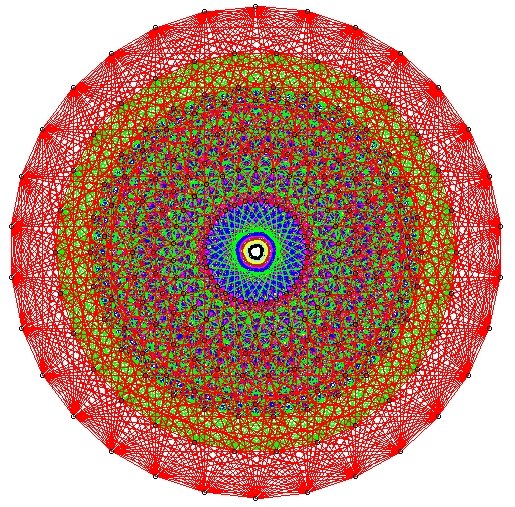
|
Atlas of Lie Groups and
Representations Galois Cohomology: code |
|
|
To use this code in realex, save it to a file mygalois.rx, and load it
in realex with the command <mygalois. This code is found in the atlas distribution, and is a combination of the files galois.rx and generate_groups.rx. If you start realex you can load both files with the command <galois.
{G is a RealForm
pi0(G)=order of component group of G(R)
H1(G)=order of Galois cohomology H^1(Gamma,G)}
set split_rank(RealForm G)=int:
let ((c,C,s),,,)=Cartan_info(most_split_Cartan(G)) in C+s
{square_classes(ic)=list of all square classes of inner class, labelled 0,1,...,n
square_classes(G)=list of all square classes of inner class of G}
set square_classes(InnerClass ic)=[[int]]:square_classes(Cartan_class(ic,0))
set square_classes(RealForm G)=[[int]]:square_classes(inner_class(G))
{assume you want all strong real forms, i.e. Cartan 0, this is just print output}
set print_strong_real(RealForm G)=void:print_strong_real(Cartan_class(G,0))
{real_forms(G): assume Cartan 0, list of real forms [RealForm]}
set real_forms(RealForm G)=[RealForm]:real_forms(Cartan_class(G,0))
set real_forms(InnerClass ic)=[RealForm]:real_forms(Cartan_class(ic,0))
{identify SO*(2m) via the information of square_classes(SO(2m,0))}
set SOstar(int n)=let Gc=SO(n,0) in let sc=square_classes(Gc) in real_forms(Gc)[sc[1][0]]
set Spinstar(int n)=let Gc=Spin(n,0) in let sc=square_classes(Gc) in real_forms(Gc)[sc[1][0]]
set PSOstar(int n)=let Gc=PSO(n,0) in let sc=square_classes(SO(n,0)) in real_forms(Gc)[sc[1][0]]
{match(v,k) returns true if k occurs in v, false otherwise}
set match([int] v,int k)=bool:
let rv=false in
let i=0 in
while i<#v do
if (v[i]=k) then rv:=true; i:=#v fi;
i+:=1
od;rv
{find(vecs,k) returns the (smallest) int j such that k in occurs in vecs[j]
returns -1 otherwise}
set find([[int]] vecs, int k)=int:
let rv=-1 in
let i=0 in
while i<#vecs do
if match(vecs[i],k) then rv:=i;i:=#vecs fi;
i+:=1
od;rv
{associated to a real form \theta is an element of Z^\theta/(1+\theta)Z
if theta=\theta_x then x^2\in Z^\Gamma represents this class
form_number(G) is the number of the real form
the central invariant is the entry in square_classes(G) containing this number
for example inner class of Sp(4,R)
square_classes=([2],[1,0,0])
form_number(Sp(4,R))=2
central_invariant(Sp(4,R))=0
form_number(Sp(2,0))=0 form_number(Sp(1,1))=1
central_invariant(Sp(2,0))=central_invariant(Sp(1,1))=1}
set central_invariant(RealForm G)=int:find(square_classes(G),form_number(G))
set central_invariant(InnerClass ic, int k)=int:central_invariant(real_forms(ic)[k])
{
strong_real_forms_same_type(ic,k)
strong_real_forms_same_type(G)
returns a list [int] (with multiplicity)
of the real form numbers in given inner class with same x^2 as given real form
real form is given by (inner class, number) or (RealForm G)
if j occurs with multiplicity this means several strong real forms mapping to the given real form
for example if ic=inner_class(Spin(4,4)) then
strong_real_forms_type(ic,0)=[4,0,0,0,0]
meaning one split strong real form and 4 compact ones
}
set strong_real_forms_same_type(InnerClass ic, int k)=[int]:square_classes(ic)[central_invariant(ic,k)]
set strong_real_forms_same_type(RealForm G)=strong_real_forms_same_type(G,form_number(G))
set pi0(RealForm G)=2^(components_rank(G))
{list of all simple root systems of given rank}
set all_simple_root_systems_given_rank(int rank)=[string]:
if ((rank>8) or (rank=5)) then ["A"+rank,"B"+rank,"C"+rank,"D"+rank] elif
(rank>5) then ["A"+rank,"B"+rank,"C"+rank,"D"+rank,"E"+rank] else
let types_of_given_rank=[["A"],["A","B","G"],["A","B","C"],["A","B","C","D","F"]
] in for type in types_of_given_rank[rank-1] do type+rank od fi
{list of allowed inner classes for given simple type}
{e.g.
all_inner_classes ("A2")
Value: ["e","u"]}
set all_inner_classes(string type_and_rank)=[string]:
let (type,rank)=(type_and_rank[0],type_and_rank[1]) in
if ((type="A" and rank !="1") or (type="D") or (type="E" and rank="6")) then ["e","u"] else ["e"] fi
{generate list of all simple groups either simply connected "sc" or adjoint "ad" of given rank
e.g. all_simple("sc",2), automatically runs over all inner classes}
set all_simple_given_isogeny_and_rank(string isogeny,int rank)=
let rootsystems=all_simple_root_systems_given_rank(rank) in
let rv=[RealForm]:[] in
for rs in rootsystems do
let inner_classes=all_inner_classes(rs) in
for ic in inner_classes do
if (isogeny ="sc") then
rv:=rv#real_forms(Cartan_class(inner_class(simply_connected (Lie_type (rs)),ic),0))
elif (isogeny="ad") then
rv:=rv#real_forms(Cartan_class(inner_class(adjoint (Lie_type (rs)),ic),0))
fi od od;rv
{all_simple("sc",k) or all_simple("ad",k)}
set all_simple(string isogeny, int rank)=all_simple_given_isogeny_and_rank(isogeny,rank)
set all_simple_simply_connected_rank(int rank)=all_simple("sc",rank)
set all_simple_adjoint_rank(int rank)=all_simple("ad",rank)
set all_simple_rank(int rank)=all_simple_simply_connected_rank(rank)#all_simple_adjoint_rank(rank)
{H^1(\Gamma,G)=H^1(\theta,G) is the number of strong real forms with given x^2\in Z}
set H1(RealForm G)=int:#strong_real_forms_same_type(G)
{calculate H1 for all simple groups of given rank bounds, both simply connected and adjoint}
set iterate_H1(int min_rank, int max_rank)=void:
for rank:max_rank-min_rank+1 from min_rank do
for isogeny in ["sc","ad"] do
prints("-------------------------------------------------------------------------");
if (isogeny ="sc") then
prints("Calculating H^1(Gamma,G) for simply connected simple groups of rank ", rank)
elif( isogeny ="ad") then
prints("Calculating H^1(Gamma,G) for adjoint simple groups of rank ", rank)
fi;
prints("");
for g in all_simple(isogeny,rank) do prints(g," ",H1(g)) od
od
od
set iterate_H1(int rank)=void:iterate_H1(rank,rank)
set iterate_H1()=void:iterate_H1(1,8)
Here is the output of the iterate_H1 command
| ||